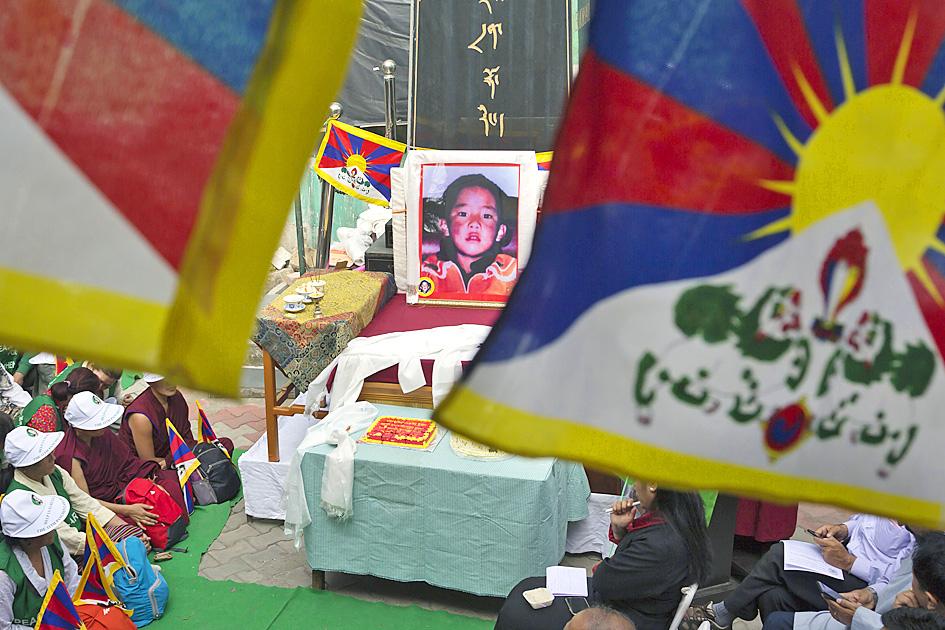Tibet’s self-declared government-in-exile in India yesterday marked the 25th anniversary of the disappearance of a boy named as Tibetan Buddhism’s second-highest figure by calling on China to account for his whereabouts.
The Tibetan parliament in Dharamsala, India, known as the Kashag, said Gedhun Choekyi Nyima, who was named as the 11th Panchen Lama and who was taken away at age six along with his family in 1995, continued to be recognized as the sole legitimate holder of his title.
Beijing, which claims Tibet as its own territory, named another boy, Gyaltsen Norbu, to the position and he is believed to live under close government control in China and is rarely seen in public.

Photo: AP
“China’s abduction of the Panchen Lama and forcible denial of his religious identity and right to practice in his monastery is not only a violation of religious freedom, but also a gross violation of human rights,” the Kashag statement said.
“If China’s claim that Tibetans in Tibet enjoy religious freedom is to be considered true, then China must provide verifiable information on the well-being and whereabouts of the 11th Panchen Lama” along with others, the statement said.
The dispute mainly focuses on political power and the arcane rituals for naming a new Panchen Lama, believed to be the reincarnation of his predecessor.
The Dalai Lama named Gedhun Choekyi Nyima as the 11th Panchen Lama with the help of Tibetan lamas trained in reading portents and signs.
China claims the reincarnate can only be chosen by pulling lots from a golden urn, a method it used to pick its own candidate under strict control of the Chinese Communist Party (CCP).
Traditionally, the Panchen Lama has served as teacher and aide to the Dalai Lama, Tibetan Buddhism’s highest leader.
Despite appeals from the UN and foreign governments and organizations, China has never provided any solid information on the condition or location of Gedhun Choekyi Nyima and his family, saying only that they did not wish to have contact with the outside world.
The 10th Panchen Lama, a controversial figure who had initially supported the CCP’s rule over Tibet before turning critical and being imprisoned by Beijing, renounced his vows as a monk in 1978. He was politically rehabilitated in 1982 after marrying the daughter of a top Chinese general.
He died in suspicious circumstances during a visit to Shigatse, the traditional seat of the Panchen Lamas, at the age of 50 in January 1989 after making speeches calling for greater religious and social freedoms for Tibetans.
Additional reporting by staff writer

AGING: As of last month, people aged 65 or older accounted for 20.06 percent of the total population and the number of couples who got married fell by 18,685 from 2024 Taiwan has surpassed South Korea as the country least willing to have children, with an annual crude birthrate of 4.62 per 1,000 people, Ministry of the Interior data showed yesterday. The nation was previously ranked the second-lowest country in terms of total fertility rate, or the average number of children a woman has in her lifetime. However, South Korea’s fertility rate began to recover from 2023, with total fertility rate rising from 0.72 and estimated to reach 0.82 to 0.85 by last year, and the crude birthrate projected at 6.7 per 1,000 people. Japan’s crude birthrate was projected to fall below six,

US President Donald Trump in an interview with the New York Times published on Thursday said that “it’s up to” Chinese President Xi Jinping (習近平) what China does on Taiwan, but that he would be “very unhappy” with a change in the “status quo.” “He [Xi] considers it to be a part of China, and that’s up to him what he’s going to be doing, but I’ve expressed to him that I would be very unhappy if he did that, and I don’t think he’ll do that. I hope he doesn’t do that,” Trump said. Trump made the comments in the context

SELF-DEFENSE: Tokyo has accelerated its spending goal and its defense minister said the nation needs to discuss whether it should develop nuclear-powered submarines China is ramping up objections to what it sees as Japan’s desire to acquire nuclear weapons, despite Tokyo’s longstanding renunciation of such arms, deepening another fissure in the two neighbors’ increasingly tense ties. In what appears to be a concerted effort, China’s foreign and defense ministries issued statements on Thursday condemning alleged remilitarism efforts by Tokyo. The remarks came as two of the country’s top think tanks jointly issued a 29-page report framing actions by “right-wing forces” in Japan as posing a “serious threat” to world peace. While that report did not define “right-wing forces,” the Chinese Ministry of Foreign Affairs was

PREPAREDNESS: Given the difficulty of importing ammunition during wartime, the Ministry of National Defense said it would prioritize ‘coproduction’ partnerships A newly formed unit of the Marine Corps tasked with land-based security operations has recently replaced its aging, domestically produced rifles with more advanced, US-made M4A1 rifles, a source said yesterday. The unnamed source familiar with the matter said the First Security Battalion of the Marine Corps’ Air Defense and Base Guard Group has replaced its older T65K2 rifles, which have been in service since the late 1980s, with the newly received M4A1s. The source did not say exactly when the upgrade took place or how many M4A1s were issued to the battalion. The confirmation came after Chinese-language media reported